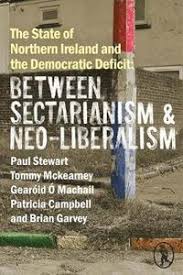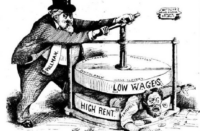- Paul Stewart, Tommy McKearney, Gearóid Ó Machail, Patricia Campbell, Brian Garvey, Between Sectarianism and Neo-Liberalism: The State of Northern Ireland and the Democratic Deficit (Glasgow: Vagabond Voices, 2018)
If, like me, you mourn the loss of intelligent debate among Irish republicans as they descend into the gobbledegook of bourgeois democracy, you’ll no doubt welcome the well-crafted and thoughtful consideration of this contribution from left republicans whose commitment to the articulation of a socialist republican analysis of our times is well established.
The authors, all of whose integrity and contribution to struggle put them beyond censorship, dare to critique the heretofore unassailable Good Friday Agreement and its almost Catholic pretensions to articles of faith.
In a series of well-written essays, the text sets out its analysis of the present-day Six Counties and developments since 1998 in the Good Friday Agreement and presents a series of actions to redress its deficits, backed up by statistics, testimony, and reference to the material reality of Six-County workers.
The thrust of the book is based on McKearney’s erudite treatise The Provisional IRA: From Insurrection to Parliament (2011) and a defence of the republican armed struggle in bringing an end to what he describes as the Orange State, ending a particular form of sectarianism manifest in the occupied Six Counties, thus paving the way to potential for the development of progressive and class politics, which was previously impossible in the confines of sectarian domination.
Having reviewed the current political situation, the book concludes that, instead of the anticipated development of progressive politics, what has in fact emerged is a further transition to a new sectarianism, allowing Catholic nationalists into the circle, dispersing the dividends of what “the state” advances them, and concludes that the formerly oppressed “minority” has taken on, with zest and equal corruption, its sectarian task of representing its own sectarian constituency.
Furthermore, they argue that the dynamic behind and the consensus within which this sectarian parity of disrespect exists is neo-liberalism.
Much effort and research has been spent on extracting UK statistics on levels of deprivation and work-place regression in terms and conditions and the general dysfunction of the northern economy. This is coupled with a description of sectarian dominance of the so-called NGO sector and disregard for the trauma of conflict.
As in The Provisional IRA, rather than leaving us in despair, where the author points to the demise of the Orange state as a tangible gain, this text attempts to offer us hope, in the face of a newly formed sectarianism, by suggesting that through a defence of and demand for social democratic reforms we might usher in a progressive shift in northern political relations. They point to “green shoots” of emerging anti-neoliberal trade unionism, left-leaning elected representatives, progressive tendencies within loyalism and demographic change that may drive new alliances.
Convinced of its argument, it further sets out its manifesto of demands around which progressive politics might occur, from a Civic Forum, a Bill of Rights, the provision of health and elderly care, properly funded education, employment rights, public housing, and progressive taxation.
All good stuff—let’s get at it, I thought, till I found my determinist heart stretching for Lenin’s discourses on imperialism and Connolly’s battle with Walker. My euphoria subsided.
Many theorists have driven themselves mad in the pursuit of proof of an unfounded theory, and it seems that this might be a case in point. For me, the founding thesis that the Orange state was overthrown, rather than simply replaced by its beneficiary (imperialism), obscures the nature of oppression in Ireland. As the text fails to highlight the fact that imperialism continues as the determining and dynamic force driving political, social and economic relations in the Six Counties, this leads me to wonder whether the authors, in their desire to find a way forward, have forgotten that sectarianism in Ireland, in whatever form, is simply the pretext on which imperialism continues to subjugate its hosts, or that sectarianism in Ireland is simply a function of capitalist control here.
It might be argued that the fact that the imperialist nature of Irish-British relations is all-powerful, and confirmed in its ability to adapt, by jumping ethnic group while still maintaining its control of the means of production and exchange, only confirms this.
If sectarianism in Ireland is indeed a function of imperialism, and as imperialism still persists as the dominant force in defining the constructs of society here, the notion of reform or even the development of progressive internal politics is impossible. The authors’ charter of progressive demands appears, despite their claim to the opposite, to be an economist charter, denying the nature of the state.
It would appear that the debate on Brexit (a discussion of which is strangely absent from this text), the singular declaration of our imperial masters, either European or British, to follow their manifest destinies in deciding our fate and the nature of our oppression, confirms the futility of attempting to reform the unreformable. If we need hope and direction on where to act, we might better look to Lenin, who advises revolution rather than reform. “Capitalism itself gradually provides the subjugated with the means and resources for their emancipation and they set out to achieve the goal which once seemed highest to the European nations: the creation of a united national state as a means to economic and cultural freedom” (V. I. Lenin, Imperialism, The Highest Stage of Capitalism).
This book is a must-read; it succeeds in its objective of provoking constructive debate towards a scientific resolution of our country’s oppression.






